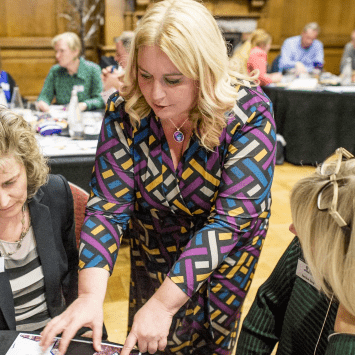Posted in Blog, Design Thinking, Facilitation, Innovation Culture, Lead, Virtual Facilitation by Jo North
How can you spot a great meeting facilitator?
A great meeting facilitator has a fantastic ability to harness the collective creativity and wisdom from everyone in the virtual or physical room. They facilitate with confidence, have exceptional leadership skills and an intuitive connection with people, whilst also creating structure and process to achieve target outcomes from the workshop, design or innovation sprint, event or meeting.
A great meeting facilitator makes the whole art and process of facilitation look natural and easy. A not-so-great facilitator makes for a painful experience, not just for the delegates but also for themselves too.
Improve your meeting facilitation skills
When you think that one of the most common human fears is giving a presentation (called glossophobia, by the way), apparently affecting 75% of the population, imagine being in the position of leading a group of people for the duration of a whole event when it’s not going so well!
Being a great meeting facilitator takes skill, practise and self-awareness, as well as preparation. And even if you’re a highly experienced facilitator, you can always grow and develop further. Great facilitators never stop learning, experimenting and sharpening their craft.
In this article, I share some of the things that I’ve learned from facilitating thousands of people, both online and in person, in innovation, strategy, training, team building and community co-creation events.
I’ll cover some of the key questions that I get asked most often when I’m coaching and training people rookie and more experienced facilitators.
What makes a great meeting facilitator?
Understanding the facilitator role is the first step toward effective meetings. You’re not just a meeting leader but also a neutral party that guides the meeting process. Your primary role is to achieve the common goal by ensuring that the right people engage in productive discussion.
A great meeting facilitator is someone who:
- Is a great leader
- Creates a process that delivers results and that is structured, yet flexible
- Brings people together
- Harnesses the collective creativity, wisdom, experience and energy of everybody in the room to deliver the objectives
- Is mindful, present and intentional
- Makes the meeting/workshop a positively memorable experience
- Helps attendees to work through challenges
- Has the ‘smarts’ and has done the research to be able to hold their own and stay apace with the contents of delegates’ discussions
1. Emotional intelligence is at the core of great facilitation
Reading the room
An effective meeting facilitator understands body language and adjusts strategies accordingly.
What is emotional intelligence?
Emotional intelligence means being able to access, interpret, manage and express emotions, relate to others and understand their perspectives. It’s about how we pick up on and empathize with the emotions that other people are feeling and influencing others positively and with integrity.
It also means being ‘un self-consciously self-aware’. In the moment, mindful, focused, intentional and in flow.
This is important because we can then listen better, connect better, and influence not just individuals, but also the group. This helps to get the most from the process and experience and achieve the task at hand.

Empathy is essential for great facilitation
One of the key ingredients of emotional intelligence is empathy.
Empathy is the ability to:
- Appreciate other people’s points of view
- Value all contributions
- Be non-judgmental
- Put ourselves in other people’s shoes
Great meeting facilitators are not judgmental and they appreciate others’ points of view. There is no view that they think is right or wrong. They provide space for all views, hence, they create psychological safety.
Psychological safety means that people feel they’re in an environment where they can share their ideas, they can challenge, they can say what they think and speak out, and they feel their opinions, and point of view will be valued.
Sometimes there are difficult or sensitive issues and being emotionally intelligent helps us to make sure that we tread the right path and that we lead attendees through that in a way that is psychologically safe.
Emotional intelligence is also needed when we’re bringing together a new team, or people who haven’t worked with each other for a while and the group is just starting to build or rebuild that connection.
We need emotional intelligence to read a room, whether it’s a virtual or a physical room.
And, we need emotional intelligence to assess ourselves in the process, to ensure we are both self aware AND working through our creative subconscious.
At the end of the day, an excellent meeting facilitator is more than just a skilled leader or a scrum master. It’s someone who blends different roles to guide team members toward a common goal while managing different personalities and roles. Effective facilitation leads to productive meetings where each single person feels heard and engaged.
2. A great meeting facilitator is ready for anything
The second key ingredient for how to be a great facilitator is to be ready for anything.
It may seem like a series of paradoxes here.
With emotional intelligence, I talked about using creative subconscious and also being considered and focused.
And here you need to have a plan, yet, be ready for anything.
But they’re not paradoxes. These are actually complementary things.
It’s super important to go into any session you’re facilitating prepared and with a plan.
Think through contingencies and options for things you think might go different than planned.
And while planning is important, so is being flexible. Sometimes it’s important to just put the plan aside, because your participants need to go in another direction to get the desired results. This could just be for part of a session, or the remainder of it. So be ready for anything. Be prepared to think on your feet. Stick to your plan, but don’t be wedded to it.
3. Design and lead an effective process to achieve your workshop objectives
It’s the job of a great meeting facilitator to design a process that will achieve the desired outcomes.
This process should be well thought out. Processes that are structured step-by-step work really well.
Setting the Stage
The Meeting Agenda
Craft a detailed agenda to outline agenda items, time limits, and the purpose of the meeting. This should be sent out ahead of time. At the beginning of the meeting, a quick check-in can help set energy levels right.
Ground Rules and Safe Space
Establish ground rules to maintain a safe space where different perspectives can be aired without judgment.
Meeting Participants and Group Dynamics
Right People and Team Members
Include the right people in the meeting. This usually means team members, team leaders, and sometimes, a meeting sponsor to validate the goals of the meeting.
Small Groups and Different Personalities
For larger teams, break into small groups to explore different roles and new ideas. Be mindful that different people bring different personalities and strong opinions into the room.
Facilitation Techniques
Open Discussion and Open-Ended Questions
Foster open discussion by asking open-ended questions. This encourages meeting participants to explore common ground.
Time Management and Next Session
Keep an eye on the clock to ensure that you stick to time limits for each agenda topic. If you run out of time, use a “parking lot” to save ideas for the next session or meeting.
Plan for all sorts of different activities, textures and levels of energy all the way through so that the process feels good for the attendees. You’ll find my articles on How to Design a Virtual Innovation Sprint and How to Get Ideas Flowing helpful.
One of the things I see with newer or less confident facilitators, or facilitators who haven’t planned too well, is if they lack confidence about what they’re doing or they’re not clear about where they’re going with something, the attendees will try and take over the facilitation.
So be strong and confident. Be prepared to lead through the process. You’re not giving the answers or coming up with the outputs, but you are making sure that everyone is working with the process to get them to the end result.
After the meeting
Action items and meeting notes
At the end of the meeting, summarize action items and key takeaways. Make sure to send out meeting notes promptly.
Good News and Next Time
End on a positive note by sharing any good news and setting expectations for the next meeting or session.
IMPORTANT: If the group is working on something and doing what they need to be doing, it’s okay for you to step back for a while and let them do their thing. You don’t want to get in the way of great progress.
4. Generate collective energy
A great meeting facilitator is magnificent at generating collective energy.
Energy is infectious! So If you are energetic, positive, and enthusiastic, people pick up on that and they will enjoy being led by you.
Sometimes you might need to be a bit calmer, maybe you need to be a bit more thoughtful, because you need your attendees to be calmer and thoughtful at those points for different types of activity.
You lead the energy of the room through what you do. You set the tone, style and the pace of where you need people to be.
Think of it as leading your participants on a journey. There are times where people need to be really highly energized, working quickly and moving around quite rapidly. Then, at another time, something may need some thoughtful reflection.
5. Combine strength and warmth
Great facilitators combine strength and warmth.
A great facilitator needs strength to lead. As a facilitator, you need to keep people on task, intervening if a conversation goes off on a tangent, or if somebody is dominating the conversation. So an appropriate level of assertiveness is important.
However, warmth is important too.
Research shows that attendees do better and enjoy sessions more when they have a good rapport with a facilitator, when there’s a likability, connection and mutual respect.
Showing that you care about the delegates, their experience, and that you value everybody’s contribution, goes a long way to bring warmth into the meeting.
So what we need to do is dial up strength AND dial up warmth, to get the right balance for any situation.
Here’s an example. There are instances when I’m facilitating that I really need people to be on time, and I’ll be very clear about that. I may say “Please be back at this time with this task completed.” I give a clear instruction, say it nicely whilst making it very clear by my tone that this is important and that I need everyone to be back on time.
Warmth is about engaging, appreciating, recognizing everybody’s contribution, and being non-judgmental.
And that combination, strength and warmth, are the two ingredients that when you put them together, create what we call CHARISMA! It’s a great way to dial up your facilitation X-factor!
8. Professional considerations
The best way and best practices
Good meeting facilitation isn’t one-size-fits-all. The best meeting facilitators adapt best practices to fit the meeting goal and type of meeting, whether it’s an agile team or a project meeting.
Career path and key meeting facilitation skills
Being a skilled meeting facilitator can be a valuable career path. Important skills include active listening skills, the ability to handle strong personalities, and making a personal connection with group members. Keep working on continuous professional development.
7. Just add YOU
And finally, just add you! You are the magic ingredient in great facilitation.
Be yourself. Don’t try and be anybody else. Don’t try and do things the way another facilitator does them.
Use your style and lean into the authentic you, because people will enjoy that.
And it’s better to be an authentic you than a poor copy of somebody else.
So find your style.
I’ve got a free masterclass for you on how to find and develop your authentic signature facilitation style. There’s also a blog with all the videos and a playbook as well.
So just add YOU. Be distinctive. Be memorable, for the right reasons.
Every great facilitator is known for who they are, what they do, and how they do things. Create your facilitator brand; that is, your personal presence. And bring that to the room every single time.
How to be a great meeting facilitator – putting it all together
When we put this all together, at the heart of it is YOU! Your authentic self, your personal brand, your facilitation style, which is powered by your emotional intelligence.
You’re tuned into what is going on, honing in on what you’re doing, ready for anything.
You’re generating the energy that you need in each moment, utilizing different energy throughout the session, leading with the just the right blend of strength and warmth. And, you’re effectively taking people through the engaging, highly effective process and series of activities that you’ve designed.
You’ve designed an excellent process to achieve the objectives of the event, and everyone wins.
Next steps
If you’d like to develop your facilitation skills further, and be part of a wonderful, supportive and like-minded community of facilitators, come and join my FREE private Facebook group, Idea Time for Facilitators. You’ll be the first to find out about new articles and videos, too, when you join. Can’t wait to see you in there!


